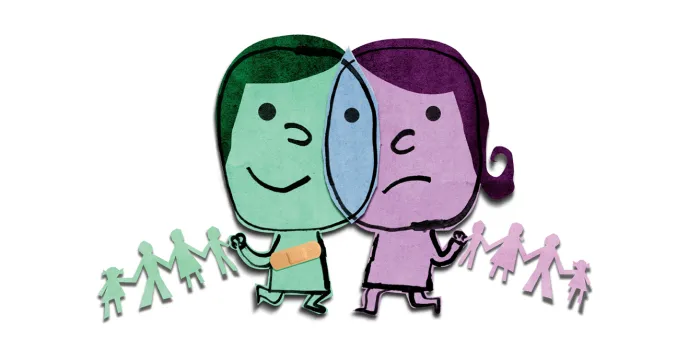When a child has a chronic health condition, it affects the whole family. Though it can cause uncertainty and stress, it also creates the possibility of drawing closer as a unit.
Of course, try telling that to a brother or sister who isn’t the focus of a parent’s continual attention. Sibling rivalry is normal, but it can be amplified when one child needs special care for an inheritable blood or bleeding disorder and one does not.
Be Aware
Kate Bazinsky’s 7-year-old son, Colin, has severe hemophilia A and requires daily infusions. During this process, he gets to pick a TV show to watch so that he’ll sit still. Aware that her 9-year-old daughter, Nora, can feel left out, Bazinsky allows her to pick the show when the family watches in the evenings.
“It’s hard for Nora because Colin’s condition requires a lot of attention from myself and my husband,” she says. “For example, if we planned to do something with Nora and Colin gets hurt and has to go to the hospital, then we have to cancel on Nora. Although she manages really well, I know she sometimes feels angry and resentful about these interruptions.”
Bazinsky says they work hard to minimize the impact. In the case of Colin’s hospital visits, she has her parents, who live nearby, watch Nora. “Instead of being an afterthought at the hospital,” Bazinsky says, “she gets to do fun things with her grandparents.”
Try These Tips
Susan Earl, a licensed clinical social worker for pediatric hematology patients at the Utah Center for Bleeding & Clotting Disorders at Primary Children’s Hospital in Salt Lake City, suggests several ways for parents to handle feelings of jealousy from siblings when one child is dealing with a medical condition.
1. Communicate openly. Be honest and keep it simple, Earl says. “Start early. Make the diagnosis a part of life. You’re going to have to point out that the child with a bleeding disorder may need more help or more attention at times.”
2. Involve siblings in care. You can teach the other children who don’t have a bleeding disorder how to help their brother or sister, Earl says. “Let them know we can all be involved in it.”
3. Attend a family camp. A lot of National Bleeding Disorders Foundation chapters offer summer camps for children with bleeding disorders, and some camps allow siblings to go, too. It’s a great way to include the brothers and sisters who might be feeling left out.
4. Support your child’s interests. Find that one thing the sibling is passionate about and support it, Earl says. Celebrating a special interest can help foster a sense of individuality in each child.
5. Teach empathy. Having a sibling with a disorder is an opportunity to teach compassion and concern. Help children try to understand what others are feeling. This can work both ways — the child with the bleeding disorder may better understand why a brother or sister is jealous sometimes.

